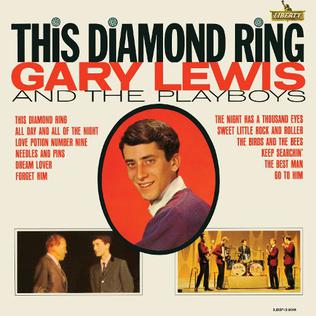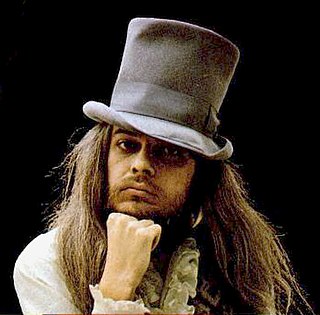"This Diamond Ring" is a 1965 song written by Al Kooper, Bob Brass and Irwin Levine. It was first recorded by Sammy Ambrose on Musicor #1061, then by Gary Lewis & the Playboys on Liberty #55756. Lewis' version charted first, #101 on the January 2, 1965, Billboard "Bubbling Under" chart. Both versions charted on January 9, Lewis still at #101 and Ambrose at #117. Ambrose dropped off the charts at that point, but Lewis made #65 on the Billboard Hot 100 chart the next week and his version continued to climb until it reached #1 on February 20, 1965.

Foxy Lady is the eighth studio album by American singer-actress Cher, released in July 1972 by Kapp Records. Following the commercial success of the previous album Gypsies, Tramps & Thieves, Cher again collaborated with Snuff Garrett (producer), Al Capp (arrangements) and her then-husband Sonny Bono (co-producer). Foxy Lady was also the second and last record for Kapp. The album was also promoted on Cher's successful The Sonny & Cher Comedy Hour show. After its release, it was well received by critics, but unlike her previous effort Gypsies, Tramps & Thieves, had only moderate chart and sales success.
Gary Lewis is an American musician who was the leader of Gary Lewis & the Playboys.
"Rubber Ball" was an early 1961 hit for Bobby Vee on Liberty Records. It was the record which made Vee an international star. The song was recorded on August 12, 1960, in a four-song, three-hour session at United in Hollywood. It was produced by a 19-year-old Texan, Thomas "Snuff" Garrett, arranged by Ernie Freeman, and was co-written at the Brill Building in New York by Gene Pitney, using his mother's maiden name (Orlowski), and by Aaron Schroeder. Veteran session drummer Earl Palmer played drums at the session.

"Young Girl" is a RIAA million-selling Gold-certified single that was written, composed, and produced by Jerry Fuller and performed by Gary Puckett & The Union Gap with instrumental backing by members of "The Wrecking Crew." It was released in 1968.
The Midnight String Quartet were an easy listening chamber music quartet, consisting of two violins, a viola, and a cello, made up of students or graduates from the University of Southern California. They played covers and standards over several albums from 1966 to the early seventies, supplemented by a professional rhythm section, often including bass, drums and guitar and sometimes piano and harpsichord.
"Save Your Heart for Me" is a song written by Gary Geld and Peter Udell. The song was originally written for and recorded by singer Brian Hyland in 1963. Although not released as a single in its own right, it was included as the B-side to Hyland's song, "I'm Afraid to Go Home," and later appeared on Hyland's 1994 greatest hits album.
"Everybody Loves a Clown" is a song written by Snuff Garrett, Gary Lewis, and Leon Russell and was recorded by Gary Lewis & the Playboys for their 1965 album, Everybody Loves a Clown. The song reached No. 4 on the Billboard Hot 100 in 1965.
"She’s Just My Style" is a song written by Al Capps, Thomas Lesslie "Snuff" Garrett, Gary Lewis, and Leon Russell and was recorded by Gary Lewis & the Playboys. The song reached #3 on The Billboard Hot 100 in January 1966.
"Sure Gonna Miss Her" is a song written by Bobby Russell and was recorded by Gary Lewis & the Playboys. The song reached #9 on The Billboard Hot 100 in 1966.

Pitch Perfect: Original Motion Picture Soundtrack is the official music for the 2012 film Pitch Perfect. The soundtrack was released digitally on September 25, 2012, and physically on October 2, 2012. Three songs from the album charted on the Billboard Hot 100: "Cups" by Anna Kendrick, which peaked at number 6; "Bellas Finals" by the Barden Bellas, which peaked at number 85; and "Riff Of" by the Barden Bellas, the Treblemakers, and the BU Harmonics, which peaked at number 86.
"Tower of Strength" is a song written by Burt Bacharach and Bob Hilliard and performed by Gene McDaniels. The song reached No. 5 on both the US Billboard chart and the R&B chart in 1961. It appeared on his 1961 album, Tower of Strength.
"Count Me In" is a song written by Glen Hardin and performed by Gary Lewis & the Playboys. The song was produced by Snuff Garrett and arranged by Leon Russell, and reached No. 2 on the Billboard Hot 100, behind Mrs. Brown, You've Got a Lovely Daughter by Herman's Hermits Outside the US, "Count Me In" went to No. 6 in Canada, and No. 49 in Australia in 1965. It was featured on their 1965 album, A Session with Gary Lewis and the Playboys.
"My Heart's Symphony" is a song written by Glen Hardin and performed by Gary Lewis & the Playboys. It reached #13 on the Billboard Hot 100, #31 in Canada, #36 in the United Kingdom, and #98 in Australia in 1966. It was featured on their 1966 album, (You Don't Have To) Paint Me a Picture.

"Turn-Down Day" is a song written by Jerry Keller and David Blume and performed by The Cyrkle. It reached #16 on both the Billboard Hot 100 and the Canadian pop chart and also reached #18 on the U.S. Cashbox chart in 1966. The song was featured on their 1966 album, Red Rubber Ball.

This Diamond Ring is the debut studio album by American band Gary Lewis & the Playboys, and was released in 1965 on Liberty Records, LRP-3408. It is the first of three charting albums released by the band in 1965.

A Session with Gary Lewis and the Playboys is the second studio album by American band Gary Lewis & the Playboys, and was released in 1965 on Liberty Records, LRP-3419. It is the second of three charting albums released by the band in 1965, and it was the band's highest charting album reaching number 18 on the Billboard 200. Two singles from this album, "Count Me In" and the Brian Hyland cover "Save Your Heart for Me" both reached number 2 on the Billboard Hot 100.

Everybody Loves a Clown is the third studio album by American band Gary Lewis & the Playboys, and was released in 1965 on Liberty Records, LRP-3428. It is the third of three charting albums released by the band in 1965, and it was the band's third highest charting original album reaching number 44 on the Billboard 200. The single "Everybody Loves a Clown" was the bands fourth single in a row to chart on the Billboard Hot 100, reaching number 4 in November 1965








